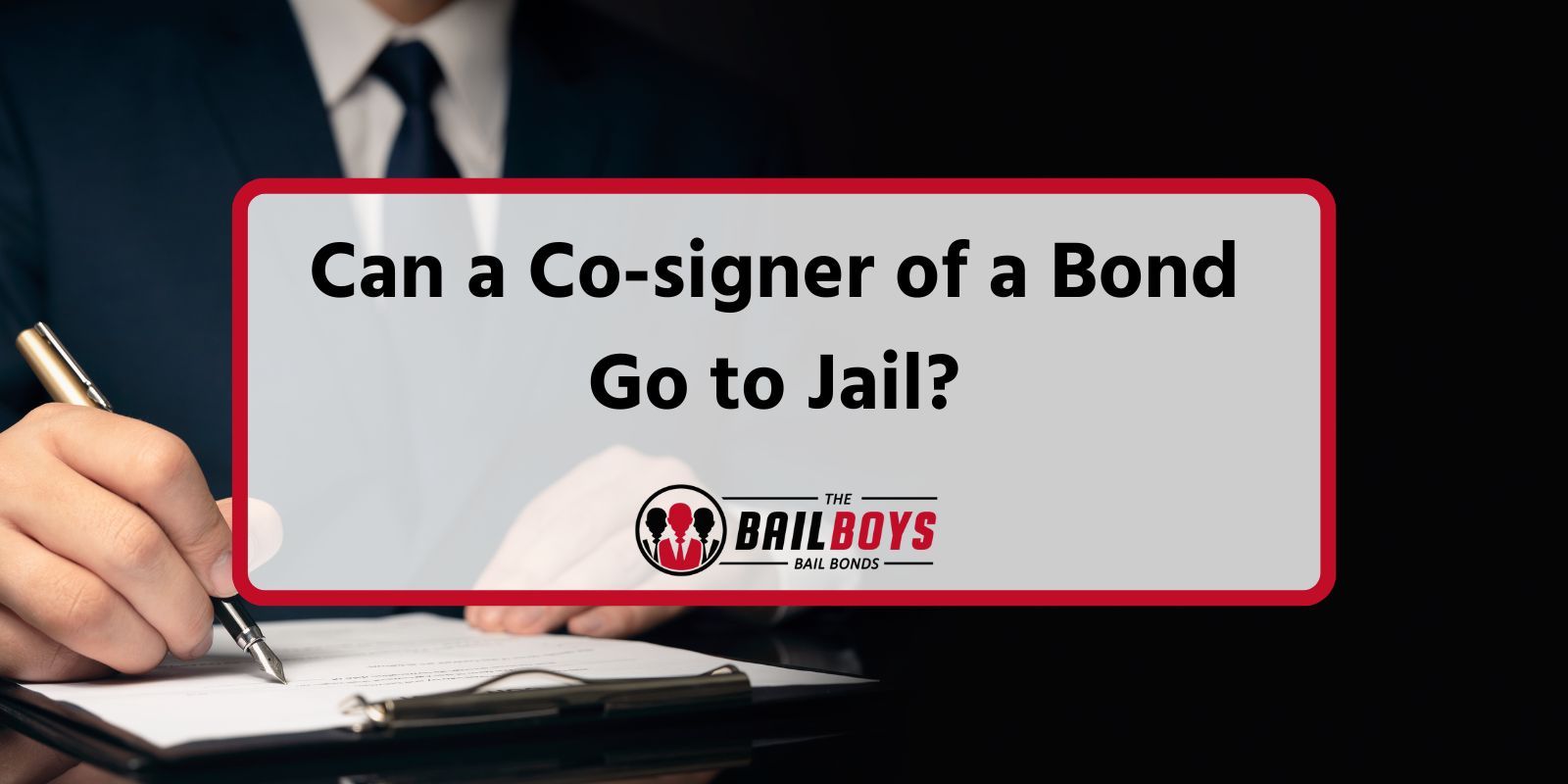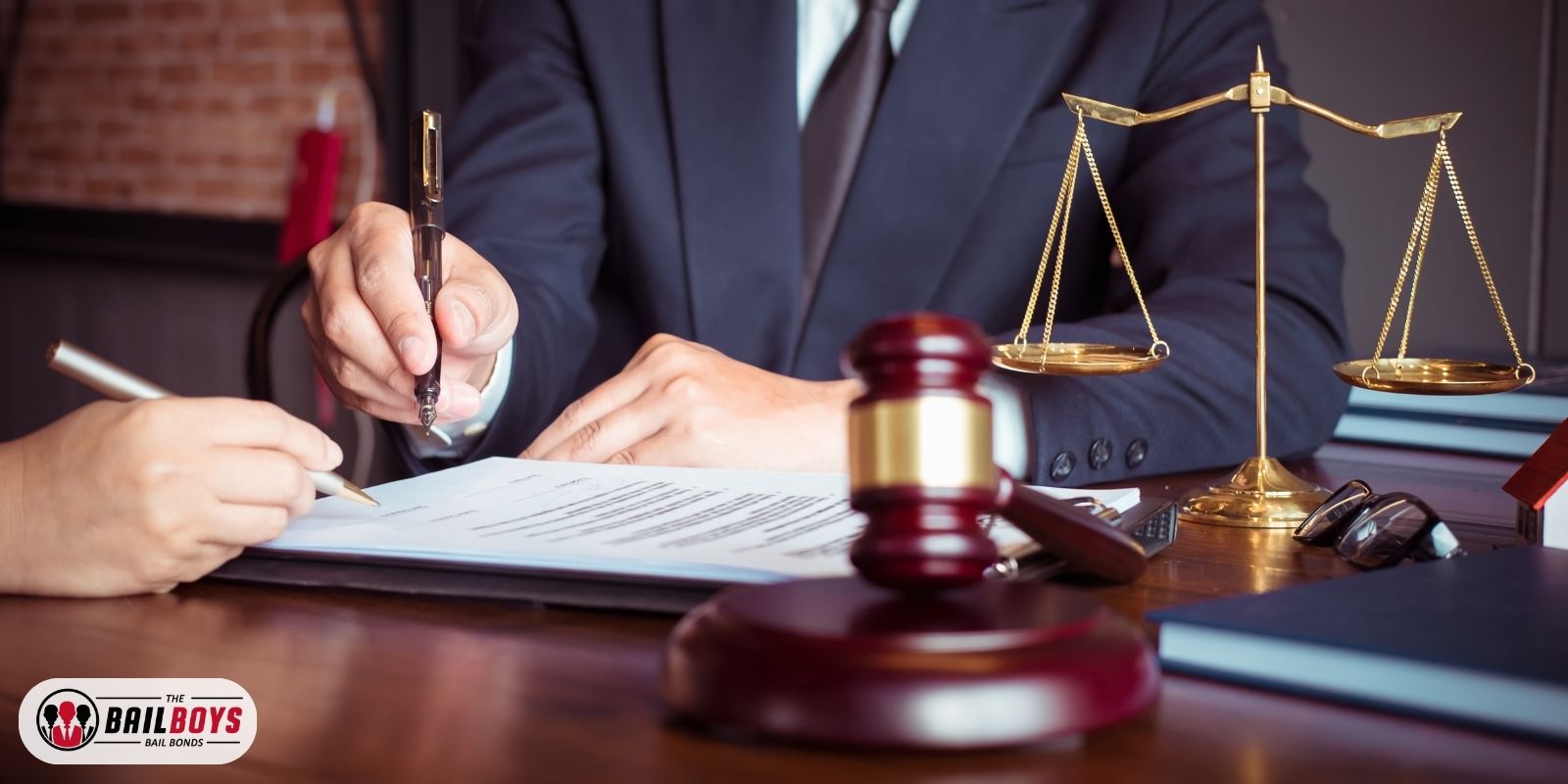
Can a Co-signer of a Bond Go to Jail?
Say your loved one is facing criminal charges and you want to help them secure their release from custody by co-signing their bail bond. That’s a good decision, but have you considered the potential risks? Can you go to jail for co-signing a bail bond? As a co-signer, there are various legal risks and responsibilities that you must bear, such as making sure the defendant appears in court.
Read this article before you co-sign a bail bond as you’ll learn about your roles as a co-signer in bail bonds, the possibility of going to jail as a co-signer, risks associated with co-signing a bail bond, protecting yourself as a cosigner, and more.
The Role of a Co-Signer in Bail Bonds
A co-signer is an individual who undertakes the financial responsibility for the defendant’s bail bond. When a defendant lacks the financial means to provide their own bond, they may need a co-signer, usually a family member, spouse, colleague in the workplace, or a friend, to secure their release from custody.
The co-signer’s primary responsibility is to ensure the defendant appears in all court scheduling. If the defendant fails to appear in court or violates their bail condition, the co-signer becomes legally obligated to pay the full bail amount. In some cases, the bail bondsman may require the co-signer to put up their assets as collateral to secure the defendant’s bail. These assets may include real estate, cash, vehicles, jewelry, and guaranteed stocks.
Qualifications of a Good Bail Bond Cosigner
Before a bail bond company qualifies you as a co-signer, here are some of the requirements you must meet:
Financial Stability
You must have a steady source of income and sufficient assets to cover the full bail money. This is to ensure you can cover the financial risks in case the defendant fails to appear for a court hearing on a scheduled court date.
Relationship With the Defendant
You must have a biological, marital, professional, or informal relationship with the defendant. This also proves that you know the defendant’s personality and circumstances and are willing to bear the risk of a bail bond co-signer.
Trustworthy and Responsible
Before you co-sign a bail bond, you must be trusted by the defendant and the bail bond agent. You must also understand the seriousness of your legal responsibilities and be willing to undertake them.
Good Credit History
Having a good credit history suggests that you’re financially responsible and trustworthy and increases your likelihood of gaining approval by the bail bondsman.
Can a Co-Signer of a Bond Go to Jail?
The bail bond agreement clearly outlines the responsibilities of the bail bond co-signer, including the payment of the full bail amount in case the defendant fails to appear in court. The co-signer may be sued by the court or the bail bond agency if they fail to meet up with their legal responsibilities, but they hardly stand the risk of jail time.
However, in certain legal circumstances, the cosigner may face jail time. For example, in a case where the co-signer helped to facilitate the defendant’s flight, provided false contact information, or in any way assisted the defendant in evading prosecution. The co-signer might be charged with obstruction of justice and could face a prison sentence.
Risks Associated with Being a Bond Co-Signer
Co-signing a bail bond involves some financial and legal risks, especially if the defendant is unwilling to follow court orders. Furthermore, co-signing a bail bond can have emotional and social implications. The legal situation of your loved one (the defendant) and the risk of losing your bail money or collateral may significantly impact your emotional well-being.
Also, standing by someone facing criminal charges as a co-signer may lead to social stigma and judgment from others. This can affect your relationship, and even harm your reputation and professional opportunities.
Protecting Yourself as a Co-Signer of Bail Bond
To protect yourself from the risks of co-signing a bail bond, here are steps you should consider:
Understand Your Responsibilities and Evaluate the Risks
Read the bail bond contract to fully understand your legal obligations. If there’s a part you don’t understand, don’t hesitate to ask for clarification. Also, assess your financial situation and mental health to determine if you’re ready to take the risks and responsibilities if you co-sign the bail bond.
Evaluate The Defendant
How trustworthy and reliable is the defendant? Do they understand their bail conditions? Are they willing to stay compliant? As a co-signer, you should be able to determine their flight risks and ability to comply with rules.
Seek Legal Advice
Before you co-sign a bail bond, it’s advisable to consult with an attorney who specializes in criminal and bail bond laws. They will help you understand the potential legal implications and guide you on how to navigate the bail bond process based on your unique situation and jurisdiction. You may also take advantage of free legal resources such as:
- Legal Aid Organizations provide free or low-cost legal assistance to individuals who are financially incapable of hiring a private attorney. Some legal aid organizations in California include Legal Aid Foundation of Los Angeles (LAFLA), Legal Services of Northern California in Sacramento(LSNC), Community Legal Aid SoCal, and more.
- Many courts have a free website where you can access legal information in the form of brochures, PDFs, and posts. Visit the websites and search for the resources that are related to bail bonds and co-signing responsibilities.
- Public Law libraries provide collections of legal materials such as law books, case law records, and legal treaties, making it a great place to do research on legal topics such as co-signing of a bail bond.
- There are many websites with online legal resources providing free legal materials, and can even help you find an attorney..
Communicate with the Defendant
Maintain clear communication with the accused person to stay updated about court dates and any developments that might impact their court appearance such as health emergencies or change in employment status. This will help you ensure the defendant stays compliant with their bail conditions.
Communicate with the Bail Bond Agency When Necessary
If any emergency situation occurs, notify the bail bond company and ask for possible solutions. They may provide you with the necessary guidance on the best steps to take.
If Necessary, Revoke the Bond
If the defendant fails to adhere to their bail conditions or shows a high flight risk, you may consider getting your name off of the bail bond. To revoke a bond, you should involve your attorney to guide you through the complexities of bail bond and co-signing laws. After that, contact the bonding company and give a logical reason for revoking your co-signing responsibilities.
Alternatives to Becoming a Co-Signer
Find Other Ways to Support the Defendant
Instead of taking the risks and responsibilities of co-signing a bail bond, you may support the defendant through other means, including:
Offering Financial Assistance
If you’re financially capable, you can contribute to the payment of the bail amount or the premium. This will help lift some part of the financial burden off the defendant.
Providing Collateral
If necessary, you can help the defendant by offering your assets as collateral.
Emotional Support
Facing criminal charges plus the legal complexities involved can negatively impact the defendant’s emotional health. Providing a listening ear and being empathic in such challenging times will help them maintain a sane mind.
Other Practical Contribution
You may contribute to other important needs such as transport fare, researching legal materials, and connecting them with legal aids. This will reduce their stress and help them focus more on dealing with their charges.
Discuss Options With Legal Professionals
Seek guidance from a criminal defense attorney and an experienced bail bondsman to know the best alternative options that you can handle. An attorney may also help you negotiate bail modification with the prosecution on the defendant’s behalf. The attorney may also challenge the bail and motion for bail bond alternatives.
Some common bail bond alternatives include:
Pretrial Programs
Some jurisdictions provide pretrial programs where they regularly supervise defendants to determine their flight risks and degree of public threat. Pretrial programs may require regular check-in, drug testing, and electronic monitoring to ensure the defendant stays within the jurisdictional boundary and adheres to their release conditions.
Release on Recognizance (RoR)
Here, the court releases the defendant without requiring them to post bail. This option is usually for individuals who are deemed low flight risks.
Conclusion
A co-signer is an individual who undertakes the financial responsibilities for the defendant’s bail bond. They may provide their assets as collateral to help the defendant secure their release. Co-signing a bail bond carries inherent risks and responsibilities, such as ensuring the defendant’s appearance in court and paying the full bail amount should they fail to appear on court dates. However, you hardly face the risk of jail time, except in the case where you facilitate the defendant’s flight, provide false contact information, or help the defendant evade prosecution.
It’s advisable you seek legal advice before signing a bail bond so you will make informed legal decisions. If you need a bail bondsman service from an experienced bail bondsman, book a free consultation with us at The Bail Boys to get started.







